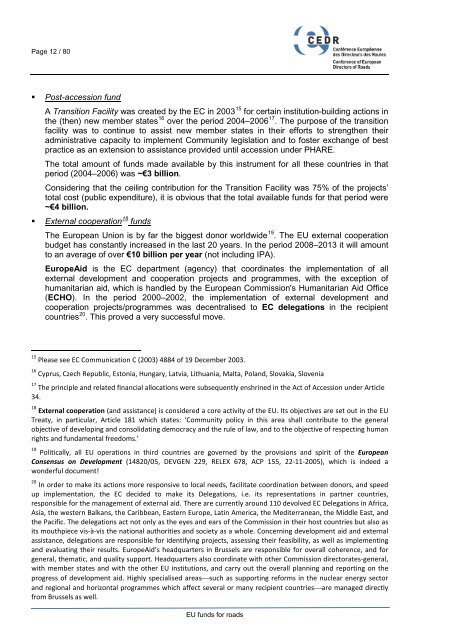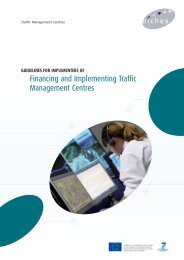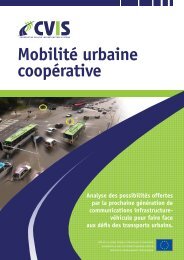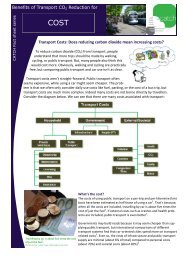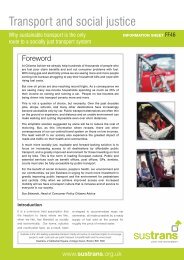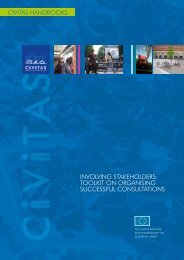EU funds for roads - CEDR
EU funds for roads - CEDR
EU funds for roads - CEDR
Create successful ePaper yourself
Turn your PDF publications into a flip-book with our unique Google optimized e-Paper software.
Page 12 / 80<br />
• Post-accession fund<br />
A Transition Facility was created by the EC in 2003<br />
15 <strong>for</strong> certain institution-building actions in<br />
the (then) new member states 16 over the period 2004–2006 17 . The purpose of the transition<br />
facility was to continue to assist new member states in their ef<strong>for</strong>ts to strengthen their<br />
administrative capacity to implement Community legislation and to foster exchange of best<br />
practice as an extension to assistance provided until accession under PHARE.<br />
The total amount of <strong>funds</strong> made available by this instrument <strong>for</strong> all these countries in that<br />
period (2004–2006) was ~€3 billion.<br />
Considering that the ceiling contribution <strong>for</strong> the Transition Facility was 75% of the projects’<br />
total cost (public expenditure), it is obvious that the total available <strong>funds</strong> <strong>for</strong> that period were<br />
~€4 billion.<br />
• External cooperation 18 <strong>funds</strong><br />
The European Union is by far the biggest donor worldwide . The <strong>EU</strong> external cooperation<br />
budget has constantly increased in the last 20 years. In the period 2008–2013 it will amount<br />
to an average of over €10 billion per year (not including IPA).<br />
EuropeAid is the EC department (agency) that coordinates the implementation of all<br />
external development and cooperation projects and programmes, with the exception of<br />
humanitarian aid, which is handled by the European Commission's Humanitarian Aid Office<br />
(ECHO). In the period 2000–2002, the implementation of external development and<br />
cooperation projects/programmes was decentralised to EC delegations in the recipient<br />
countries<br />
20 . This proved a very successful move.<br />
19<br />
15 Please see EC Communication C (2003) 4884 of 19 December 2003.<br />
16 Cyprus, Czech Republic, Estonia, Hungary, Latvia, Lithuania, Malta, Poland, Slovakia, Slovenia<br />
17 The principle and related financial allocations were subsequently enshrined in the Act of Accession under Article<br />
34.<br />
18 External cooperation (and assistance) is considered a core activity of the <strong>EU</strong>. Its objectives are set out in the <strong>EU</strong><br />
Treaty, in particular, Article 181 which states: ‘Community policy in this area shall contribute to the general<br />
objective of developing and consolidating democracy and the rule of law, and to the objective of respecting human<br />
rights and fundamental freedoms.’<br />
19 Politically, all <strong>EU</strong> operations in third countries are governed by the provisions and spirit of the European<br />
Consensus on Development (14820/05, DEVGEN 229, RELEX 678, ACP 155, 22-11-2005), which is indeed a<br />
wonderful document!<br />
20 In order to make its actions more responsive to local needs, facilitate coordination between donors, and speed<br />
up implementation, the EC decided to make its Delegations, i.e. its representations in partner countries,<br />
responsible <strong>for</strong> the management of external aid. There are currently around 110 devolved EC Delegations in Africa,<br />
Asia, the western Balkans, the Caribbean, Eastern Europe, Latin America, the Mediterranean, the Middle East, and<br />
the Pacific. The delegations act not only as the eyes and ears of the Commission in their host countries but also as<br />
its mouthpiece vis-à-vis the national authorities and society as a whole. Concerning development aid and external<br />
assistance, delegations are responsible <strong>for</strong> identifying projects, assessing their feasibility, as well as implementing<br />
and evaluating their results. EuropeAid’s headquarters in Brussels are responsible <strong>for</strong> overall coherence, and <strong>for</strong><br />
general, thematic, and quality support. Headquarters also coordinate with other Commission directorates-general,<br />
with member states and with the other <strong>EU</strong> institutions, and carry out the overall planning and reporting on the<br />
progress of development aid. Highly specialised areas⎯such as supporting re<strong>for</strong>ms in the nuclear energy sector<br />
and regional and horizontal programmes which affect several or many recipient countries⎯are managed directly<br />
from Brussels as well.<br />
<strong>EU</strong> <strong>funds</strong> <strong>for</strong> <strong>roads</strong>


